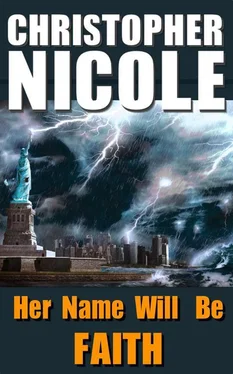Nancy wished them joy. She only wanted to get ashore, and several times on the voyage she had consigned her soul to God, as boats had come perilously close, several even colliding, with much grinding of fenders and shouting and swearing from irate skippers and terrified passengers. If Ernie thought that Yonkers was safe, that was good enough for her.
Her sister-in-law, Marge, obviously felt the same way. “Just let Nance and the kids and me ashore,” she begged. “You can do what you like after.”
“In one minute, darling,” Ernie promised. “Secure that bow warp, Bill; make it good and fast.”
The pier was crowded with boats already moored or mooring up, and with their crews. There were a couple of restaurants across the street with their awnings destroyed by the wind, but their interiors could be seen to be packed with people, either having a late lunch or drowning their sorrows. The wind was powerful up here, but not half as strong as it had been down in the harbor.
As soon as the boat was secured alongside, Marge and Nancy grabbed the children, one by each hand, and staggered up the pier and on to the land. Nancy felt like kneeling down and kissing it, even in the pouring rain. The two women got the four children across the street and into the warmth and forced jollity of the bar, where there appeared to be a huge, if somewhat hysterical, party in progress; they were welcomed as if they were the two special guests for whom everyone had been waiting. A jukebox was blaring, and someone bought each of the women a beer. The children were lifted up to sit on the bar counter and given sodas — there was apparently no question of paying.
Relief flooded through Nancy’s system, as she turned round to look at the boat, where Bill and Ernie were still patiently securing extra warps and springers, making sure nothing was going to damage her.
Nothing?
“Holy Mary Mother of God,” said the Irishman standing beside her. People crowded against them, rubbing misted breath from the glass to see better, staring in horror at the huge wave coming up the river.
“Just like a bore,” said someone who had obviously seen one of the rivers in Europe acting like a funnel for the rising tide. “What the French call the Mascaret.”
Nancy abandoned the children and ran outside. “Bill!” she screamed, her voice dissipating on the wind. “Ernie! Come ashore! Hurry!”
The men, and all the others still tending their craft, had seen what was coming, and scrambled on to the pier. Ernie slipped and fell, and Bill turned back to help him. Then the tidal bore struck. It was already carrying, high on its 15-foot crest, an assortment of shattered boats and pieces of driftwood and various flotsams. Now it smashed through the pier and the moored boats like an axe through pastry, sweeping them on up the river, a foaming maelstrom of destruction, boats, animals, shore side houses… and men. The last Nancy saw of Bill and Ernie was them clinging desperately to pieces of the destroyed pier as they were carried out of sight. She looked up at the heavens to scream her agony and grief… and found herself looking at blue sky.
National American Broadcasting Service Offices, Fifth Avenue — 3.00 pm
The lights in the NABS building had flickered several times before finally going out. By then Richard, to whom everyone left in the building had instinctively turned for leadership, had had the emergency generator started, and he had also assembled all the staff in the main studios, which had no external windows and was by far the safest place to be; all broadcasting had naturally ceased — if they still had the power to put out, they knew no one in the city still had the power to receive. They were all suffering from at least shock. In addition to Julian, several people had been badly hurt either by flying glass as more and more windows had shattered, or by falling down stairs when caught by sudden gusts of wind rampaging through the building. These had been treated and sedated as far as possible. But the building itself was a wreck; nearly all the windows had been blown in or sucked out, and the resulting damage to offices was shattering; that the roof had remained on was due not only to the strength of its construction but to the prompt closing of every possible door. Those doors were in fact failing, one by one, but slowly, and Richard had some hope they might just last the storm; he knew they had to be approaching the eye.
The principal horror was Julian’s body, lying beneath a sheet on the studio floor, with the room around him packed with frightened people — even if the generator kept the air-conditioning going. The Mayor had said, justifiably enough, that the most acute danger was that of drowning, that those in buildings situated more than fifty feet above water level would be physically safe, whatever damage their dwellings or offices might have to suffer. Julian had been in such a building, and the storm had not even reached its height when he died. If only they had evacuated the offices a few minutes earlier — but not even Richard had envisaged such a tragedy.
The thought of that happening to Jo was unbearable. He had tried to reach her by phone several times, but without success; now the phones were all dead. Then, once he could no longer fulfill his role as a weatherman he had thought of attempting to get to her… it was only a few blocks. But he had known that no one could survive, much less move on those streets. So he had waited, and now… others had heard it too. Heads began to raise as a huge, deathly stillness overtook the afternoon; the sudden cessation of the almost intolerable racket with which they had existed for so long was stunning. People stared at each other in bewilderment, and when they spoke, they shouted, as they had had to do all morning, and then hastily dropped their voices to whispers. But they were euphoric whispers; could the catastrophe be over?
“Not quite,” Richard told them. “This is the eye of the storm. It was travelling so quickly last time we had an update that it’s not likely to last more than half an hour at the outside. Then the wind is going to blow again, just as hard as before, only from the other direction, west, instead of east. But we’re winning. We know the storm is passing through; things can only get better from here on. And with the wind in the west that water level is going to get pushed back down to normal pretty rapidly. So just sit tight for another few hours, and we’ll all be able to leave.”
Reassured, they were chatting now. Richard went over to Jayme, who sat on the floor staring into space; Julian had been a special friend. “Listen,” he said in her ear. “I’m leaving now. If anyone wants to know where I’ve gone, tell them I’m trying to find out what’s happening out there, and that I’ll be back. But keep convincing them they’re better off here than anywhere else, at least until the wind has dropped.”
For a moment she just looked at him, eyes blank. Then her head jerked. “Going out? Where?”
“I must get to Mrs Donnelly. She’s alone in her apartment with her children… God knows what they must have gone through.”
“Mrs Donnelly…” she blinked at him, then gave a faint smile. “You and her? Well, what do you know. But you can’t go outside. When the storm comes back you’ll be killed.”
“I reckon I have time to make it, just. I have to go, Jayme. So, see you tomorrow.”
“Tomorrow!” Her eyes were wide. That wasn’t a thinkable thought.
Richard let himself out of one of the doors leading into a side corridor. The utter silence of the building outside the studio was uncanny. He didn’t want to chance the elevators just in case the generator failed or the mechanism had been damaged, instead took the stone stairs, hurrying down, panting less with exertion than apprehension.
Читать дальше












